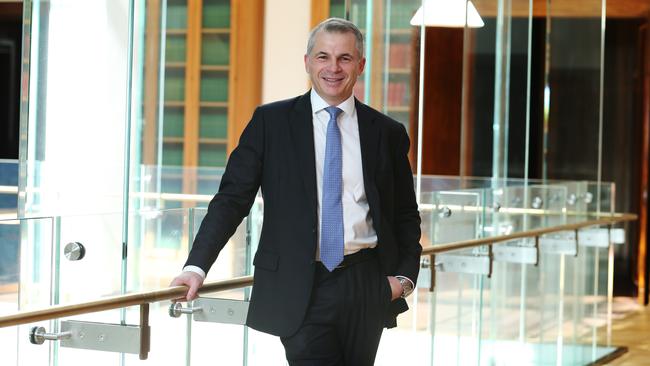Law firms resistant to predicted downturn in economy and jobs
Australian legal firms withstood heavy inflationary pressures to emerge from the financial year boasting larger workforces and bolstered revenue.

Australian legal firms withstood heavy inflationary pressures to emerge from the financial year boasting larger workforces and bolstered revenue, with leaders attributing spikes in activity to business booms in emerging sectors and those less susceptible to market volatility.
The Australian’s Legal Partnerships Survey reveals that harsh economic headwinds weren’t enough to stop Australian firms going on hiring sprees, with the number of fee-earners rising by 6 per cent over the past year.
Growth opportunities were also in abundance, with the number of partners growing by 6 per cent across the board. However, graduate hiring eased slightly (down 6 per cent), which is understood to be a precautionary measure taken by firms that feared the worst as a potential recession loomed.
Eaton Strategy + Search strategic adviser Shaaron Dalton told The Australian that while firms were bracing for a slowdown and some had briefly frozen hiring, for most practices the drop-off in business never came.
“Sure, there‘s been a bit of a softening in the corporate commercial market, particularly at the top end,” she said, “but it really isn’t affecting firms, because there’s been such a lot of new practice areas.”

Areas such as the public sector, property, cyber security, family and energy had been booming, Ms Dalton said, meaning law firms may have seen a drop in some areas, but a sharp spike in others.
“The highest demand that we have at the moment is energy, particularly renewables,” she said. “Any sort of energy expertise is really well regarded.”
Firms were resistant to troubles that plagued overseas markets. Many companies across Britain and the US let thousands of employees go, cut benefits and froze pay.
Cadwalader Wickersham & Taft in April reportedly sacked about 30 business professionals and 15 associates. Cooley, Goodwin Procter, Stroock & Stroock & Lavan and Shearman Sterling also axed lawyers over the past year, citing a slowdown in work.
But while some smaller firms such as Banki Haddock Fiora (-26 per cent), Swaab (-40 per cent) and Keypoint Law (-63 per cent) had a reduction in fee-earners, most of the larger players in Australia saw a rise in overall headcount.
Global firm Ashurst lifted the number of fee-earners by 13 per cent over the past year, and saw an 8.5 per cent increase in partners. Global CEO Paul Jenkins said while the firm wasn’t immune to difficult economic challenges, the strength in some practice areas should “more than offset” any short-term decline.
“Economic conditions continue to be softer, both in Australia and across each of the global jurisdictions in which we operate,” he said. “Persistent high inflation, wage pressures and rising costs are affecting many businesses, with some facing a tougher operating environment than others. This is naturally increasing caution for some of our clients. Strong growth in a number of practice areas and jurisdictions, however, should more than offset any short-term decline in work in some areas.”

Hamilton Locke managing partner Nick Humphrey said the firm, where fee-earner increased by nearly 28 per cent and partners increased by 18.5 per cent, would continue to grow over the coming year.
“We foresee an uptick in all our practice groups with a higher expected growth rate in specific practice areas. In terms of growing practice areas, we forecast an uptick in our finance, litigation, restructuring, financial services, insolvency and workplace practice groups,” he said.
“In line with our sector expertise and offerings, we foresee the largest growth opportunities in our utilities, infrastructure, health, government and new energy offerings.”
Mr Humphrey said the firm also expected a shift in the activity of practice groups across varying locations, forecasting “growth in our Brisbane and Perth corporate practices due to their exposure to the mining and agribusiness industries”.
Pinsent Masons partner Matthew Croagh said the firm, which had a 40 per cent increase in fee-earners, was looking to expand across the Asia-Pacific region as specific markets continued to grow. “We will look to continue to hire in key focus areas, such as energy, infrastructure, construction, real estate and corporate, while also adding capability in key disciplines such as employment,” he said. “In particular, there is demand for talent at the senior associate and experienced associates level across the projects and corporate areas of our firm.”
Addisons CEO Kieran Parker said demand for the firm’s resources was “solid” following a 7 per cent lift in fee-earner count, and the practice would continue to hire into the new financial year.
“Addisons will continue to welcome outstanding lawyers,” he said. “Our focus is on our corporate M&A, property, and employment and WHS practices in particular, and we are looking for strong candidates in those areas.”








To join the conversation, please log in. Don't have an account? Register
Join the conversation, you are commenting as Logout